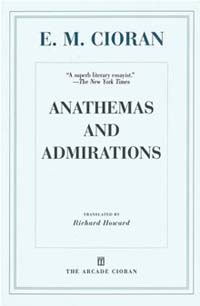AN ADMIRATION OF F. SCOTT FITZGERALD BY CIORAN
 Anathemas and Admirations
Anathemas and Admirations
by E. M. Cioran
Arcade Publishing, Nov 2012
272 pages / $14.95 Buy from Amazon
E.M. Cioran’s work indicates the caustic philosophical consequences of sleepless rumination upon insignificance and failure. It is thick with anxiety, but retains buoyancy, the sick humour of sneering into the abyss. For a generation allied by smug cynicism and chic nihilism, to encounter a space of understanding free of the sour stench of complaint might be palliative! It could correct the posture, provide iron to the will, destroy some friendships, and it might well be a taste of joy, a flicker of warmth… at the very least, it might mortify those prone to complaint…
Cioran was a Romanian born philosopher mystic who honed his craft in French, known for sharp edged aphorisms, fragments, recalling Nietzsche’s Daybreak. His was the bleak philosophy of insomnia, horrific laboring through late hours, candid lamentations of his very birth, his eyes drooping down his skull, a cigarette sizzling against an open sore. In Beyond Good and Evil, Nietzsche states “the thought of suicide is a strong consolation; one can get through many a bad night with it.” Cioran’s entire oeuvre can be seen as exploring this sentiment.
In 2012, a number of his books were published in fine editions. Anathemas and Admirations collects two of his books, Exercise d’admiration and Aveux et anathèmes. The resulting combination allies a series of literary essays – the admirations of a wide range of writers including Borges, Beckett, Fitzgerald – alongside clusters of confessional aphorisms:
“To have nothing more in common with men than the fact of being a man!”
“One can imagine everything, predict everything, save for how long one can sink.”
Cioran’s admirations offer intimate curmudgeonly affection on other writers, and are exemplary accounts of his method and approach. For instance, in Some Meetings, Cioran offers moments of intimacy with Beckett which reveal as much about Beckett’s saintly detachment as Cioran’s brooding disgust: “he disparages no one, unaware of the hygienic function of malevolence.” For reference points on other literary admirations, Henry Miller’s love letter to himself in the guise of a study of Rimbaud and Nick Land’s deranged engagement with Bataille both come to mind in the sense that they eschew the deft theoretical engagement of masters like Blanchot for a biographical confession of obsession and ruin.
April 12th, 2013 / 12:00 pm
